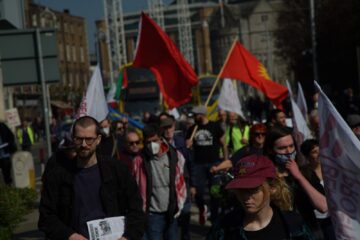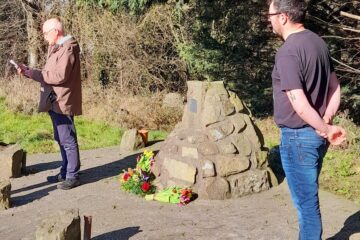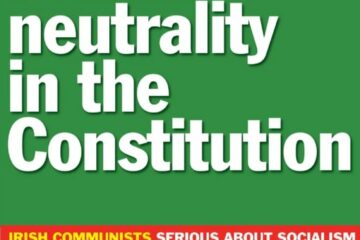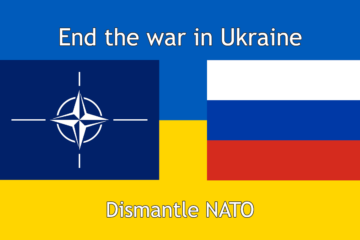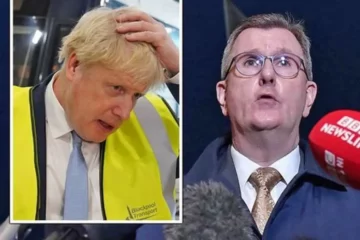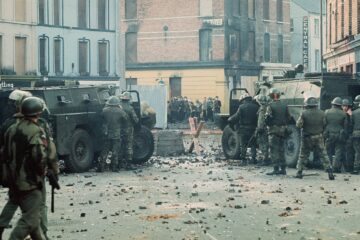Statement by the Communist Party of Ireland
30 May 2019
All elections are but a snapshot of the degree of political or class consciousness of the mass of the people, in particular of working people.
It is clear from the turnout in the recent elections, both north and south, that large numbers of people (more than half) decided not to bother voting at all—a phenomenon that is not confined to Ireland but is an increasing trend in capitalist countries.
The re-emergence of the opportunist Green Party as a factor at both the local and the EU level is largely a reflection of growing concern by people about the environmental catastrophe facing us all. It was the actions and mobilisation of hundreds of thousands of young people in Ireland and Europe, demanding action from governments to save the planet, that galvanised public opinion. The growth in support for the Green Party is not a reflection of support for its policies, which are not anti-corporate but are centred on changing life styles for those who can afford to do so, and punishing those who can’t.
People well remember this party’s role in government: bank bail-outs, the imposition of EU debt on Irish people, cuts in the minimum wage, and water and service charges. Working people need to be vigilant, as more of these policies will be coming wherever the Green Party has an influence on decision-making.
The left parties, including Sinn Féin, People Before Profit, and Socialist Party, failed to make the advances they had hoped for in the local elections or, in the case of Sinn Féin, lost heavily. A significant factor in these losses has been the manoeuvring and side deals with local power structures, which have not gone unnoticed by working people, such as the selling off of public lands, making deals in return for small quantities of “social housing,” but never challenging the fundamental strategy of government policy.
In any case, working people realise that local authorities have little power, and the little they have is in the hands of the city and county managers, the local state apparatus. People see local government as being powerless, controlled by vested interests.
In particular, the effect of the mass mobilisation of working people on water charges, which benefited Sinn Féin, People Before Profit, and the Socialist Party, has now subsided. People Before Profit (Socialist Workers’ Party) and Solidarity (Socialist Party) won 28 seats in the 2014 elections, now down to 11 seats in 2019. Sinn Féin won 15 per cent of the vote in 2014, falling to 9½ per cent in 2019, with the number of seats falling from 159 to 82.
The left grew when workers were in struggle and mobilised to advance their interests. Working people have begun to realise that they won only a partial victory on water charges. They are beginning to see through the political opportunism of elements of the left, organisations that are all too willing to use working people’s anger for short-term electoral gains. Many workers who participated in such campaigns feel let down by those who are prepared to enter government with Fianna Fáil, the Labour Party, or even Fine Gael.
It is not just in Ireland that the left suffered setbacks but in all the member-states of the European Union. The right has captured the frustrations of working people as expressed in their opposition to all things EU. It capitalises on this by exploiting the scares of capitalism, but it does not and will not challenge the source: monopoly capitalism, as now manifested in the European Union and its institutions.
The Irish left, like most of the left in the EU, peddled the illusion that “another Europe is possible,” with “a People’s Europe” and other such opportunist slogans. Much of the Irish and European left have positioned themselves as essentially left-liberals, rarely challenging the fundamental nature of the system that is responsible for the gross inequality, poverty, mass unemployment and super-exploitation experienced daily by millions of working families—a system designed to protect the interests of the 1 per cent. They minimise class antagonism and class struggle in favour of culture wars.
The elections to the fraudulent “European Parliament” have confirmed the local election results, with the establishment parties consolidating the middle ground, Sinn Féin losing a seat, and a number of progressive left independents winning seats. Sinn Féin’s volte face in relation to the EU has sown a great deal of confusion within working-class communities, north and south, as well as among its own members. But opportunism will always reveal itself in the long run.
Brexit continues to sow division and confusion throughout the country but particularly in the north of Ireland. The election of the leader of the Alliance Party, Naomi Long, to the EU Parliament reflects the confusion within elements of the unionist professional and business classes about how they can promote their own material self-interest. The support for the Alliance Party—which advocates remaining in the EU—is consistent, following the results of the local elections, and may well herald the end of the Ulster Unionist Party.
The contradictions thrown up by Brexit are causing confusion among elements of unionism as they struggle to see how their interests are best served, with the DUP and Traditional Unionist Voice trying to out-unionist each other, steeped, as they both are, in bigotry.
At this juncture the future of the people of the north of Ireland is not being decided by themselves but by the split in the British ruling class and the crisis in the EU. The Brexit crisis has been damaging to both the European Union and the British Union; nevertheless the contending imperial interests of Britain and the EU have no concern for the welfare of the people of Ireland.
If the working class is to advance its own class interests, more than elections or electoral strategies are required. If we want radical change, this is not attainable through electoral cycles but rather through the mobilisation of the class as a political power of itself, not mediated through institutional structures designed to deaden and blunt any challenge to the system.
It’s out of the chambers and into the communities: to build organisations to advance the interests of working people, to build working people’s power.
“Don’t be ‘practical’ in politics. To be practical in that sense means that you have schooled yourself to think along the lines, and in the grooves that those who rob you would desire you to think.”—James Connolly



